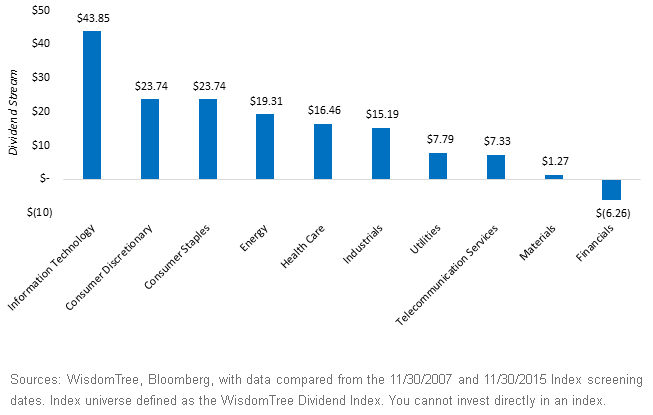
 By Christopher Gannatti, Associate Director of Research, WisdomTree
By Christopher Gannatti, Associate Director of Research, WisdomTree
Special to the Financial Independence Hub
Smart beta exchange-traded funds (ETFs) are rapidly proliferating and capturing assets at a faster clip than the broader ETF industry. In 2015, 143 smart beta ETFs came to market, [Note 1] representing half of the year’s new ETF launches, or double the percentage of traditional beta products born last year.
Dividend strategies are one of the primary drivers of smart beta ETF growth. Smart beta ETFs had about $616 billion in assets under management at the end of 2015, [Note 2] and more than a quarter of that total was allocated to dividend-oriented funds.
Since the publication of the widely followed Fama-French research in 1993, outperformance of fundamentally weighted indexes has mostly been attributed to the market factor, the size factor (mid- and small caps outperforming larger stocks) and the value factor. [Note 3] Later, momentum factor was added as an accepted driver of fundamental weighting’s ability to top market cap-weighted strategies.
At WisdomTree, we believe weighting by dividends elevates fundamental indexing or smart beta. In 2006, 25 dividend ETFs [Note 4] came to market, 22 of which courtesy of WisdomTree. Our Dividend Stream® weighting methodology offers distinct advantages over weighting by market capitalization, dividend yield or focusing on the number of consecutive years that companies have increased payouts.
WisdomTree’s Approach to Dividends
WisdomTree dividend benchmarks, such as the WisdomTree LargeCap Dividend Index (WTLDI) and the WisdomTree Dividend Index (WTDI), weight included stocks by utilizing the annual dividend distributions firms have declared they will pay in the coming annual cycle. This forward-looking methodology can help bolster a portfolio’s trailing 12-month dividend yield, while factoring in the most up-to-date dividend policies of included constituents.
Flexibility to Reflect Dividend Growth Trends
One of the most exciting illustrations of this principle has been in the Information Technology sector. At our 2007 annual screening, this sector made up only about $16 billion of a $288 billion Dividend Stream. But by 2015, it comprised over $60 billion of a $440 billion Dividend Stream—an almost fourfold increase. [Note 5]
• The WisdomTree Dividend Index saw the Information Technology sector go from a 5% weight after the 2007 rebalance to over a 13% weight after the 2015 rebalance.
• The WisdomTree LargeCap Dividend Index saw this sector go from a 6% weight after the 2007 rebalance to almost a 15% weight after the 2015 rebalance.
It is also interesting that Financials—approximately one-third of 2007’s Dividend Stream—are the only sector that hasn’t quite returned to its 2007 levels. After the sector’s dividend reductions (in some cases government mandated), WisdomTree Indexes took down their exposures. The 2015 Dividend Stream—due to the widespread growth across other sectors—is now much better balanced across sectors than was the case in 2007, in our view.
United States Dividend Stream Growth by Sector since November 30, 2007 (Pre-crisis)

Smart Beta Strategies That Access Multiple Drivers of Returns
Another consequence of our focus on dividends is exposure to multiple distinct return premiums—such as value, quality and low volatility. These types of factor tools have been popular of late, now that implementation tools readily exist. However, who would have anticipated that:
• 2015 was the year of growth and momentum — so much so that Facebook, Amazon, Netflix and Google, the so-called FANG [Note 6] stocks, came into prominence.
• With a simple flip of the calendar, value and lower volatility came back into favor at the start of 2016.
The high-level benefits of our approach to dividends include:
• Broadly inclusive nature that has exhibited a high correlation to established index benchmarks—especially value index benchmarks.
• Exposure to more precise size-cuts. These strategies do not introduce small-cap or mid-cap bias through their selection and weighting mechanisms.
• Sensitivity to the quality premium. Especially in the United States, there is a signaling aspect to firms declaring a regular dividend, insofar as the belief exists that it can be maintained over time.
• Exposure to the low-volatility premium. Going back nearly 10 years, it is not uncommon that our broad-based dividend strategies tend to have betas of .85 to .95 when measured against their market capitalization-weighted benchmarks.
While individual factors may come in and out of favor, strategies that combine exposure to multiple drivers of return may be more consistent over time.
1 Source: Aniket Ullal “A Review of ETF Launches in 2015,” Nasdaq, 1/11/16.
2 Source: Attracta Mooney “Smart Beta ‘Could Go Horribly Wrong’”, Financial Times, 2/22/2016.
3 Source: Robert Dubil, “How Dumb Is Smart Beta? Analyzing the Growth of Fundamental Indexing,” Journal of Financial Planning, 28 (3): 49–54.
4 Source: Ben Johnson, “Not All Dividend ETFs Are Created Equal,” Morningstar, 4/1/15.
5 Sources: WisdomTree, Bloomberg, with data as of 11/30/15 Index screening.
6 Chris Ciaccia, “What Are FANG Stocks and Why Does Jim Cramer Love Them?,” TheStreet.com, 7/24/15.
Important Risks Related to this Article
Dividends are not guaranteed and a company currently paying dividends may cease paying dividends at any time.
Commissions, trailing commissions, management fees and expenses all may be associated with investing in WisdomTree ETFs. Please read the relevant prospectus before investing. WisdomTree ETFs are not guaranteed, their values change frequently and past performance may not be repeated. Past performance is not indicative of future results. This material contains the opinions of the author, which are subject to change, and should not to be considered or interpreted as a recommendation to participate in any particular trading strategy, or deemed to be an offer or sale of any investment product and it should not be relied on as such. There is no guarantee that any strategies discussed will work under all market conditions. This material represents an assessment of the market environment at a specific time and is not intended to be a forecast of future events or a guarantee of future results. This material should not be relied upon as research or investment advice regarding any security in particular. The user of this information assumes the entire risk of any use made of the information provided herein. Neither WisdomTree nor its affiliates provide tax or legal advice. Investors seeking tax or legal advice should consult their tax or legal advisor. Unless expressly stated otherwise the opinions, interpretations or findings expressed herein do not necessarily represent the views of WisdomTree or any of its affiliates. The MSCI information may only be used for your internal use, may not be reproduced or re-disseminated in any form and may not be used as a basis for or component of any financial instruments or products or indexes. None of the MSCI information is intended to constitute investment advice or a recommendation to make (or refrain from making) any kind of investment decision and may not be relied on as such. Historical data and analysis should not be taken as an indication or guarantee of any future performance analysis, forecast or prediction. The MSCI information is provided on an “as is” basis and the user of this information assumes the entire risk of any use made of this information. MSCI, each of its affiliates and each entity involved in compiling, computing or creating any MSCI information (collectively, the “MSCI Parties”) expressly disclaims all warranties. With respect to this information, in no event shall any MSCI Party have any liability for any direct, indirect, special, incidental, punitive, consequential (including loss profits) or any other damages (www.msci.com) “WisdomTree” is a marketing name used by WisdomTree Investments, Inc. and its affiliates globally. WisdomTree Asset Management Canada, Inc., a wholly-owned subsidiary of WisdomTree Investments, Inc., is the manager and trustee of the WisdomTree ETFs listed for trading on the Toronto Stock Exchange.


